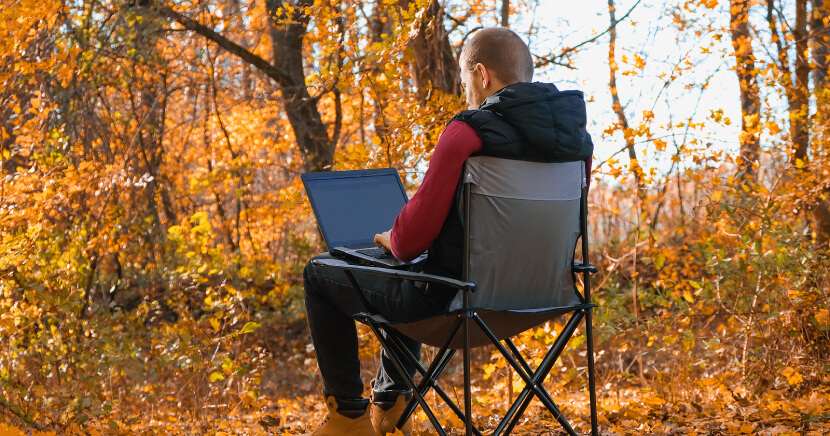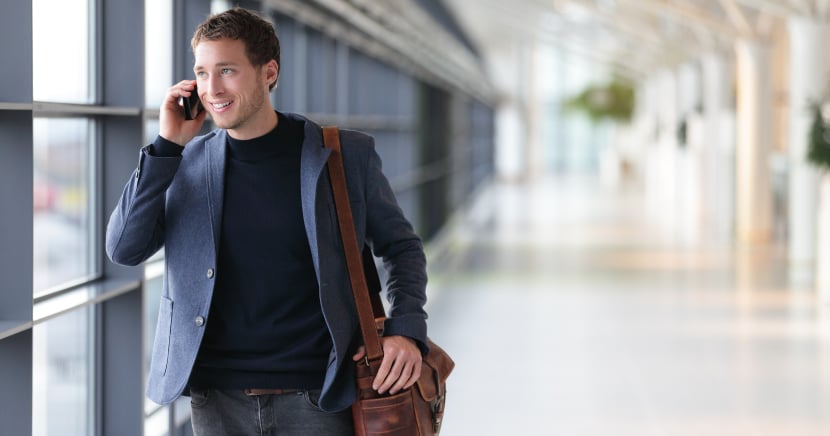“Are you traveling for business, or for pleasure?”
That's a very common question asked at airport checkouts. But why not both? Well, the hospitality sector is now aiming to unleash the potential of one of its hitherto unexplored business niches that will revolutionize the sector as a whole. Business + Leisure = Bleisure travel, which is set to become the next big thing in hospitality.
Combining tourism opportunities with business trips makes sense for both employees and employers. Employees are happy working in an exotic location and meeting their commitments, and many will extend a work trip to add more vacation elements. When workers are happy, it's good for the bottom line.
The rise of bleisure travel has contributed to a shift in the demography of the hospitality sector's target audience. To understand this shift, let's explore what bleisure travel is, and also take a look at digital nomadism.
See also:
What is bleisure travel?

Bleisure travel refers to the practice of combining business and leisure travel, allowing travelers to extend their stay beyond work obligations and explore the destination and immerse themselves in the local culture.
The popularity of bleisure tourism began to pick up steam around 2016, and it has two main categories of travelers. The first comprises business travelers who bring friends or family along with them to share the experience. The second group consists of guests who opt to add a few days of vacation to their business trips.
To make the most of their trips, many bleisure travelers will often take advantage of flights or hotel accommodations paid for by their employers. This arrangement allows them to enjoy some downtime or explore local sights before or after their professional commitments.
A healthy and happy brain always comes up with better ideas and execution. When the happy juices flow, employees are more creative. This logic dictates the foundation of bonuses, performance-based raises and other incentives. A paid vacation where an employee is committed to business needs works like a charm.
When the COVID-19 pandemic hit, the number of business travelers to the US dropped from 7 million in 2019 to 1.6 million in 2020. However, according to a survey from Booking.com, business travel is increasing steadily again, with companies incentivizing corporate trips to bring their employees together:
More than half (52%) of employers are currently planning corporate travel trips to bring together employees who now largely work remotely. In doing so they can acknowledge the importance of in-person communication, and encourage attendance by providing an appealing location.... 56% of employed people agreed that the importance of face-to-face internal meetings, and meetings with clients, underline the need for business travel. But these trips also present opportunities for business travelers to act on their desires for adventure.
Work-free vacations: the old version of employee benefits
On paper, bleisure travel seems like a great way for employers to increase their brand value and corporate social responsibility. On the other hand, what if seasoned business travelers don’t want to be a part of it? According to that Booking.com survey, there are growing numbers of business travelers who want their vacations to be strictly work-free. Both Argentina (154%) and New Zealand (218%) saw a dramatic increase in the number of employees who say they prefer non-working vacations.
Many employees choose to utilize the freedom of flexible working to completely disconnect from work and make the most of their downtime wisely. For instance, overcrowding at popular tourist attractions can significantly deter travelers, especially in the post-pandemic era when people value personal space more than ever. This could explain why around 65% of US employees plan to utilize their flexible work arrangements to visit tourist attractions during quieter periods.
However, not all employees seek out typical tourist traps for their travel breaks. We have also examined the preferences of workers regarding getaways, and a notable percentage of them express a desire to explore offbeat destinations.
Travel has become a style statement for millennials. The fact that employers are paying the expenses makes it even sweeter. According to a survey by Marriott and Chase, 78% of the millennial population wants to include personal time in business travel.
The Amex Global Business Travel research report indicates that 74% of business travelers want entertainment as a part of the travel budget designed by employers.
Reasons for the increasing popularity of bleisure travel
The rise of bleisure travel can be attributed to the growing emphasis on increased flexibility in work arrangements and the desire to make the most out of business trips by combining them with enjoyable experiences.
Work-life balance
Bleisure travel offers a way for professionals to strike a better work-life balance by blending corporate travel with personal enjoyment. It allows them to take some time off work and enjoy fun activities without having to take additional leave.
Cost efficiency
For business travelers, extending their stay for leisure purposes can be financially beneficial. Since the employer typically covers the cost of the initial trip, adding personal days can be a cost-effective way to explore a destination without bearing the full expense.
Cultural exposure and immersion
Business travelers often visit diverse and interesting locations. By extending their stay, they get the opportunity to immerse themselves in the local culture, try new cuisines, visit landmarks and experience the destination beyond conference rooms and meetings.
Networking opportunities and career enhancements

Bleisure trips can provide additional networking opportunities. By spending more time in a location, professionals may have the chance to interact with local professionals or clients, leading to potential business collaborations.
Boosting the hospitality industry
The rise of bleisure travel has a positive impact on the tourism industry. It means more people exploring local attractions, staying in hotels, dining at restaurants and participating in leisure activities, thus contributing to the local economy.
Stress reduction
Business travel can be stressful, but the addition of leisure time allows individuals to unwind and relax. This can lead to increased job satisfaction and improved mental well-being.
Flexibility in scheduling
With technological advancements and remote work options, professionals often have more flexible schedules. This enables them to adjust their travel plans and include suitable leisure days.
Experience accumulation
Many business travelers enjoy collecting unique experiences from different places they visit. Bleisure travel offers an avenue to enrich their experiences and create lasting memories.
Family time in tourist destinations
By bringing family members along on business trips, individuals can enjoy quality time with loved ones and transform what would have been a solo business trip into a memorable family vacation.
What's in it for the hospitality industry?
As mentioned earlier, the demographics of business travel have significantly changed over a few years. In fact, employers are also focusing more on the overall well-being of valued employees. Besides the productive benefits of bleisure trips for employers, the hospitality industry enjoys the following benefits:
Extended stays
Bleisure travelers often extend their stays in a destination, which translates to more nights booked in hotels. According to the Global Business Travel Association, an overwhelming majority of business travelers (82%) stay at the same place for both the business and leisure travel portions of their stay. This increases occupancy rates and higher revenue for hotels and other accommodations.
Additional spending contributing to revenue growth
Bleisure travelers are more likely than the strictly business traveler to engage in leisure activities, dine at local restaurants and explore the destination. This results in additional spending on entertainment, dining and other experiences, boosting the local economy.
Business travel upsells
By promoting the concept of bleisure, hotels and airlines can offer special packages or incentives for travelers on business trips to extend their stays for leisure. This upselling opportunity can lead to increased revenue for the hospitality business.
Loyalty and repeat buying
A positive experience can create loyal customers who may choose the same hotel or accommodation for future business or leisure trips. This loyalty can lead to repeat business and word-of-mouth referrals.
Off-peak travel
Bleisure travelers tend to have more flexibility in their travel schedules, allowing them to visit destinations during off-peak periods. This helps hotels maintain a more consistent flow of guests throughout the year, even during low seasons.
Meeting and event opportunities
Corporate travelers who opt for bleisure may be more likely to attend meetings, conferences, or events at hotels or convention centers. This increases the chances of booking meeting spaces and generating revenue from these events.
The art of maximizing flexibility

Bleisure travel is the art of maximizing the flexibility of remote working for the business traveler. It allows corporate travelers to enrich their work journeys with pleasurable activities, providing a rewarding experience. Employers can also benefit by ensuring that business travel isn't solely about work but also a chance to fulfil their employees' travel aspirations that may have been out of reach previously.
The increasing frequency of business trips, coupled with the rise of flexible and remote work arrangements, creates an ideal environment for the flourishing of bleisure. The integration of work, travel and recreation has the potential to bring advantages to both employees and employers, potentially leading to improved productivity and higher job satisfaction.
The brilliant combination of business and leisure can be a great boon to a travel destination's economy. Surveys and reports provide data-driven insights into how this trend is growing much faster than expected. The wide range of demographic features and exclusive travel plans specifically designed to meet business needs are contributing to its growth.









